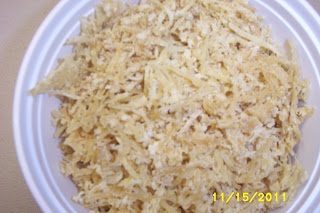I went to my mom's house for two weeks and we canned apricots and made apricot jam.
Apricot Jam - I can't give you an exact recipe, but we halved and pitted apricots and put them in a pot to cook. I mashed them with a potato masher (one with holes not metal loops) and kept mashing and cooking until they were broken into pieces and soft. Then added sugar to taste. It is not as sweet as store bought jam and not as sweet as the recipe that uses pectin. I used Ultra Gel to thicken it. Also made some with Splenda. The jam is a thinner than normal, but we wanted it that way.
Ultra Gel is a perfect thickener for canning. I buy it by the case and keep it here for others to buy from me. It is made in Boise, ID and I can get it without paying the shipping cost. Contact me if you want some.
We make lots of fruit leather. We used apricots with applesauce and apricots with strawberries.
Mom had strawberries in her freezer that need to be uses, so I tried mixing apricots and strawberries.
We added Agave to sweeten it. Use any liquid sweetener as desired. Do not use granulated sweetener. It will become brittle. Put the fruit and sweetener in a blender and puree. Taste and add fruit and sweetener as desired.
This one had more strawberries.
This one had more apricots.
Pour the puree onto a very very lightly greased fruit leather sheet. I use a nonstick spray. I give it a couple of quick sprays and use a paper towel to spread the spray around the entire sheet and absorb any extra. Too much spray will make the fruit leather feel greasy and none will make it stick to the fruit leather sheet.
This is the apricot and applesauce mixture, but I wanted to show how using a cake decorating spatula is perfect for spreading the puree.
These were dried at about 125 degrees for 6 to 8 hours until they were no longer wet, but were pliable and slightly tacky.
After they are dry I fold them in half and cut at the fold line.
Lay each half on a sheet of plastic wrap and roll it up. If you don't put it on plastic it will end up stuck together into a fruit leather log.
I store them in a plastic zip lock bag. I also label and date the bag.
This is some tomatoes that we peeled and pureed. They were not paste tomatoes. It was very juicy. I ended up with 5 or maybe 6 trays of puree. Dry until crisp. This was sprayed with nonstick spray the same as the fruit leather.
None of these became completely crisp. They are still slightly pliable after hours of drying. They seem to get to a certain dryness and don't change even with many more hours of drying. I don't know it the nonstick spray made a difference or not. Mom took them off of the fruit leather trays and put them directly onto the drying racks and no change. She is going to dry putting them in the oven on the lowest setting to see what happens.
Talked to mom the next day and the tomato leather didn't crisp up even after an hour in the oven. I will do some more experimenting with tomato leather next year.
After drying an hour or two this is what it looked like.
Here I cut the tomatoes into several pieces and used my fingers to scrape out seeds and juice. There is a lot less seeds and the pulp is a lot thicker. I got 3 1/2 trays of puree this way.
Mom had cabbage that we needed to do something with too. Sauerkraut takes too long, so we decided to dry some. Cut it by hand and remove the core. Cut into strips.
We tried the food processor first and this is what we got. That was okay, because we wanted coleslaw too. We just had to make it sooner than planned.
Put the strips on the dehydrator. There were dried at 130 degrees until crisp. I pulled what I could apart, but the way it curls into itself I couldn't pull it apart much, so I just separated it as I could as it dried.
Here what I ended up with. This will be used in soups this winter. I must say that I liked eating the dry strips.
I also picked sage leaves to try. Wash them and remove the stems. Place on the dehydrator and dry until crisp. They dried at 130 degrees. They were curled in on themselves when done.
This is what I got from three trays of leaves.

















































